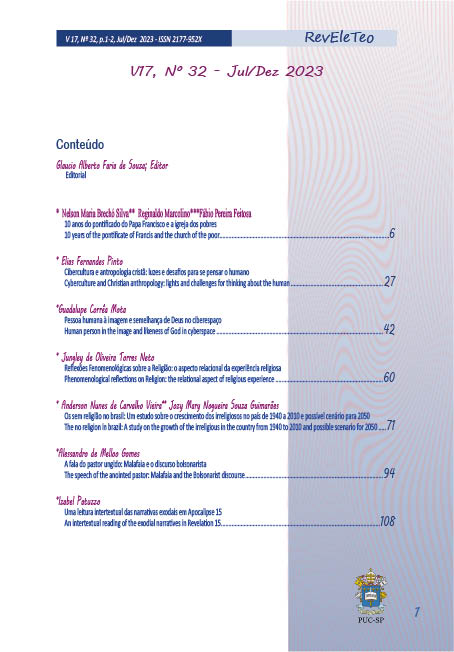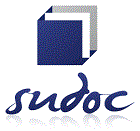The no religion in brazil
A study on the growth of the irreligious in the country from 1940 to 2010 and possible scenario for 2050
DOI:
https://doi.org/10.23925/2177-952X.2023v17i32p71-93Keywords:
Religion, Without religion, Irreligious, ReligiosityAbstract
In Brazil, according to the Demographic Census survey conducted in 2010 by the Brazilian Institute of Geography and Statistics (IBGE), the number of people declaring themselves without religion has increased substantially since 1940. The numbers jumped from a mere 0.2% to more than 8% of the population surveyed over a period of 70 years. Thus, this research focused on studying this religious scenario describing the evolution of this growth and consequently the increase in the number of people who declare themselves without religion in Brazil. The overall objective was to demonstrate that there is a significant growth of the so-called “no-religion” group in Brazil, and that growth tends to increase further by 2050. The methodological approach employed was the mixed one, ie, the employment was first used of a quantitative approach - to sketch the present and future scenario of the religious segments - and later the qualitative analysis to identify the possible causes that has led to the growth of the non-religious. It was concluded that the number of non-religious in Brazil is in access and with great potential for future growth, fostered mainly by the transit of believers among religions, which has led to religious disenchantment and indifference, thus contributing to the expansion of irreligious in the country.
References
CAMPBELL, C. Para uma Sociologia da Irreligião. Londres: McMillan, 1971.
CAMPOS, I. Desigrejados – Teoria, história e contradições do niilismo eclesiástico. Rio de Janeiro: bvbooks, 2017.
Dicionário de Ciências Sociais. Rio de Janeiro: Ed. da FGV, 1986.
DURKHEIM, E. Definição do Fenômeno Religioso e da Religião. In: DURKHEIM, E. “As formas elementares da vida religiosa”. São Paulo: Martins Fontes, 2000.
EVERETT, D. L. O Significado do Nome — Cosmologia e Nominação entre os Pirahã. Rio de Janeiro: Sette Letras, 1993.
FEBVRE, L. O domínio da religião sobre a vida. In, MOTA, C. G. (org). São Paulo: Ática, 1978.
GRESCHAT, H. J. O que é ciência da religião? – Coleção repensando a religião. São Paulo: Paulinas, 2005.
INSTITUTO BRASILEIRO DE GEOGRAFIA E ESTATÍSTICA – IBGE. Dados da Religião no Brasil. Mapa da religião no Brasil IBGE. Disponível em: <http://www.ibge.gov.br/estadosat/temas.php?tema=censodemog2010_religiao> acesso em junho de 2017.
INSTITUTO BRASILEIRO DE GEOGRAFIA E ESTATÍSTICA – IBGE. Estimativa da População Brasileira para 2050. Disponível em: <http://downloads.ibge.gov.br/downloads_estatisticas.htm?caminho=Projecao_da_Populacao/Revisao_2008_Projecoes_1980_2050/> acesso em julho de 2017.
INSTITUTO BRASILEIRO DE GEOGRAFIA E ESTATÍSTICA – IBGE. Pesquisa de Orçamentos Familiares – POF IBGE 2008-2009. Disponível em: <https://sidra.ibge.gov.br/pesquisa/pof/tabelas> acesso em julho de 2017.
MARCONI, M. A.; LAKATOS, E. M. Fundamentos de metodologia Científica. 7. ed. São Paulo: Editora Atlas, 2010.
NICODEMUS, A. O ateísmo cristão e outras ameaças a igreja. São Paulo: Mundo Cristão, 2011.
PETERSON, T. Católicos, voltem pra casa. Nova York: Cléofas, 2002.
SILVA, E. L.; MENEZES, E. M. Metodologia da pesquisa e elaboração de dissertação. 4. ed. rev. atual.Florianópolis: UFSC, 2005.
VON SPERLING, M. Princípios do tratamento biológico de águas residuárias. Vol. 1. Introdução à qualidade das águas e ao tratamento de esgotos. Departamento de Engenharia Sanitária e Ambiental. Belo Horizonte: UFMG. 3aed, 2005.
WORLDWIDE INDEPENDENT NETWORK OF MARKET RESEACH– WIN/Gellup. The sceneryofreligions in the world. Disponível em: <http://www.wingia.com/en/services/end_of_year_survey_2016/10/> acesso em junho de 2017.
ZUCKERMAN, P. O não religioso: compreendendo pessoas e sociedades seculares. Londres: Oxford University Press, 2016.





